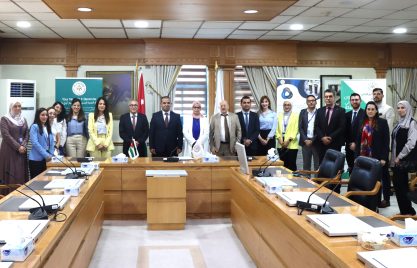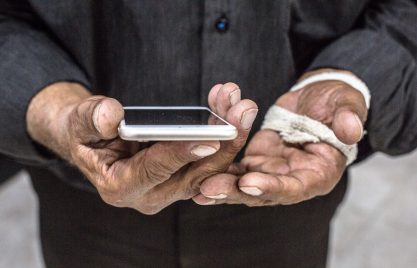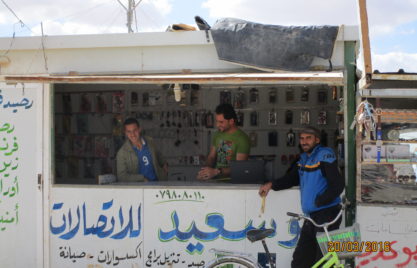In theory, it all sounds so straightforward: Leveraging the high penetration of mobile phones to extend financial services among unbanked Jordanians and refugees. In practice, however, generating awareness, uptake and lasting impact of digital financial services (DFS) on people’s lives has been proving to be far more complex.
In theory, it all sounds so straightforward: Leveraging the high penetration of mobile phones to extend financial services among unbanked Jordanians and refugees. In practice, however, generating awareness, uptake and lasting impact of digital financial services (DFS) on people’s lives has been proving to be far more complex.
A new publication by GIZ and Amarante Consulting sheds light on the state of DFS and the persisting challenges of reaching refugees with mobile wallets in Jordan. It also highlights the findings of a public-private partnership between GIZ and mobile Payment Service Provider (PSP) Dinarak aimed at advancing the financial inclusion of refugees. This blog post shares some of the main insights gained.
Mobile wallets for refugees- A strong value proposition
As of January 2019, the total number of Syrian refugees in Jordan stands at over 671,000. The majority of refugees (85%) live below the poverty line; nearly three quarters (73%) receive cash assistance; 40% rely exclusively on aid. According to a study conducted by GIZ and CGAP, financial inclusion of refugees is nearly nonexistent, while mobile phone penetration is widespread (85% SIM card penetration).
Opening a mobile wallet in Jordan is free of charge, requires no minimum balance, and no previous bank account ownership. Versatile use cases include deposits, bill payments, and national remittances. Regulations by the Central Bank of Jordan (CBJ) allow refugees to open a wallet with their UNHCR asylum seeker certificate, in combination with their Ministry of the Interior (MOI) issued card. For the mostly unbanked refugees in the country, mobile wallets could offer a welcome alternative to cash. Yet, just about 2% of Syrian refugees in Jordan have registered for an account. So what’s behind the seeming reluctance?
Factors hindering uptake and usage on-the-ground
Lack of funds and use cases: The report finds that whatever cash assistance refugees receive is spent almost entirely on meeting daily needs, leaving no extra funds to deposit into a separate account. Assistance is currently disbursed in cash or digitally through prepaid cards or (cardless) ATM withdrawals. Even if beneficiaries see value in the services of a mobile wallet, few take the extra step of visiting an agent to deposit any remaining funds. What’s more, agent outlets in the country remain limited in number and reach.
Mobilizing humanitarian agencies to disburse funds through mobile wallets could allow beneficiaries to perform financial transactions such as person-to-person- or bill payments through their mobile phones. Expanding use cases such as cross-border remittances and merchant payments at WFP-contracted shops, for example, could further strengthen the value proposition of mobile wallets for refugees.
Lack of awareness and trust: Despite progressive regulations in place, many refugees are unaware that they can open wallets using their UNHCR ID and MOI card. Some also express a lack of trust in PSPs and fears of their financial transactions being traceable.
To address such concerns, further community-based outreach and awareness building efforts are needed; providers must leverage trusted sources of information, such as word-of-mouth from family and friends, and pursue below-the-line marketing campaigns. As one focus group participant stated: “[The PSP] should go to areas with a high concentration of Syrian refugees, find out the large supermarkets and sign them up as agents – this will help raise awareness.”
Partnering with the private sector to reach the unbanked
Recognizing the aforementioned potential and challenges of mobile money in Jordan, the GIZ Digi#ances project entered a development partnership with Dinarak to increase wallet uptake and usage among unbanked Jordanians and Syrian refugees. GIZ provided technical assistance on the areas of agent network management, customer-centric marketing and business strategy development. The partnership helped Dinarak deploy marketing materials specifically targeting Syrian refugees, and expand its operations in the north of the country, home to the largest refugee host communities in the country.
Today, the two-year-old start-up enjoys a market share of 21% in terms of total registered wallets, is first in the market in terms of active agents and stands second in terms of total number of wallets opened and transactions processed.
Sector wide challenges with generating uptake and active usage of mobile wallets across Jordan remain. GIZ – alongside other public and private stakeholders in the country- is committed to continue thriving forward to turn mobile money from a mere value proposition into an everyday reality. Click here to read the full report.
By Byoung Hwa Hwang



